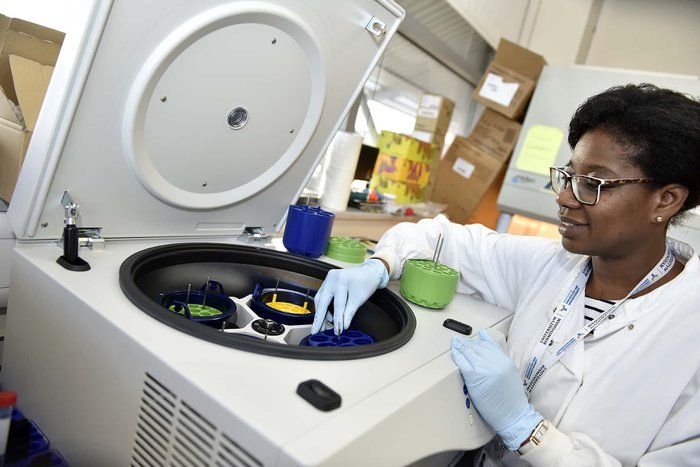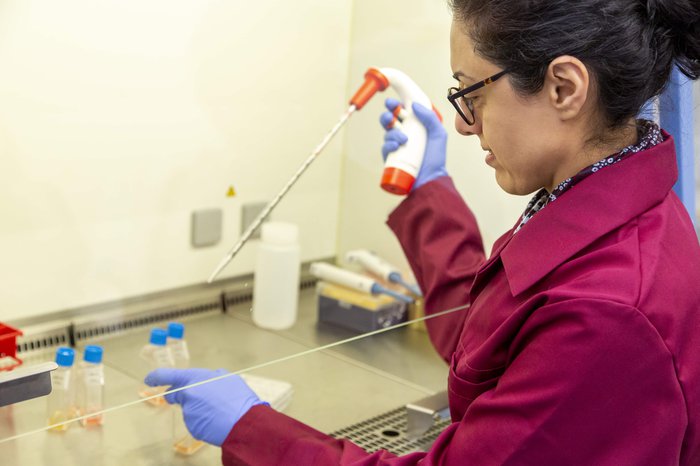Research – the impact of the pandemic
The blood cancer research we fund has been significantly affected by the pandemic.

Most of our research projects had to pause as laboratories closed during lockdown. In some cases it was not as simple as just picking up where they left off, as there were some things – cancer cells growing in the laboratories, for example – that had to be started again.
The clinical trials we fund also stopped taking on new patients as a result of lockdown. This has had serious consequences, as it has sometimes meant that people who have run out of treatment options have not been able to access a treatment that might give them more time.
As well as the research already underway being set back, the financial impact of the pandemic meant we were able to fund much less new research than we had expected. We announced £3.8 million of new research funding in 2020/21 compared to the £5.7 million we had originally planned to award. But despite the pandemic, we still funded exciting new projects, including:
- Dr Sarah Dimeloe of the University of Birmingham will try to manipulate T cells to make them better able to destroy myeloma cells.
- Dr Daniel Wiseman at the University of Manchester will look at whether a new drug can help improve outcomes for people with MDS/MPN Overlap Syndromes.
- Professor David Vetrie at the University of Glasgow will try to find out if targeting a particular protein can prevent chronic myloid leukaemia suddenly becoming more aggressive.

We are now funding 167 researchers at 27 research institutions across the UK. There are also 4,726 people with blood cancer on the clinical trials we fund, so as well as those trials adding to our understanding, they mean those people will have the chance to access promising new treatments not yet available on the NHS.
As well as funding new research, the research we funded in previous years continued to deliver exciting new results. However we published less research than the previous year as a result of the disruption from the pandemic. Eighty papers were published in scientific journals about the results of Blood Cancer UK-funded research, each one a breakthrough that takes us a small step closer to the day blood cancer is finally beaten.
These included:
- Professor Anthony Moorman at Newcastle University looked at data from 2,400 children with acute lymphoblastic leukaemia (ALL) and used it to show that some children could be spared having the most intensive chemotherapy (which can cause serious side effects) without affecting their risks of survival, while others who are at particularly high risk of relapse could have more chemotherapy to try to prevent the cancer returning. There now needs to be a clinical trial to check that it works, and if it does then it could then be used for standard treatment.
- Professor Eric So at King’s College London showed that an antibiotic used to treat diarrhoea could be used to make an aggressive type of blood cancer called MLL-AML more sensitive to chemotherapy. MLL-AML has a particularly poor prognosis because it becomes resistant to chemotherapy, so Prof So’s work raises the hope that using this antibiotic could improve people’s chances of survival.
- Dr Alex Tonks at Cardiff University found that blocking a particular molecule on acute myeloid leukaemia (AML) cells led to an increase in immune cells that are involved in destroying cancer cells. We hope this discovery could one day lead to a new treatment that could help improve the low survival rate for AML by targeting this molecule.
- Professor James Allan at Newcastle University looked at data from 842 people with chronic lymphocytic leukaemia (CLL) to see if there were any factors that might predict which cases were likely to grow more aggressively. Prof Allen has identified changes in two genes that seem to predict this, and this could help develop a tool for doctors to identify patients who might benefit from early treatment.
As well as funding research, a big focus for us in 2020/21 was developing a new research strategy. This involved consulting people across the blood cancer research community about which areas of research offer the most exciting opportunities over the next few years, and talking to people affected by blood cancer to make sure our research reflects what is important to them. Published in June 2021, it will help us to continue to make sure the money we spend on research has the biggest possible impact for people affected by blood cancer.
